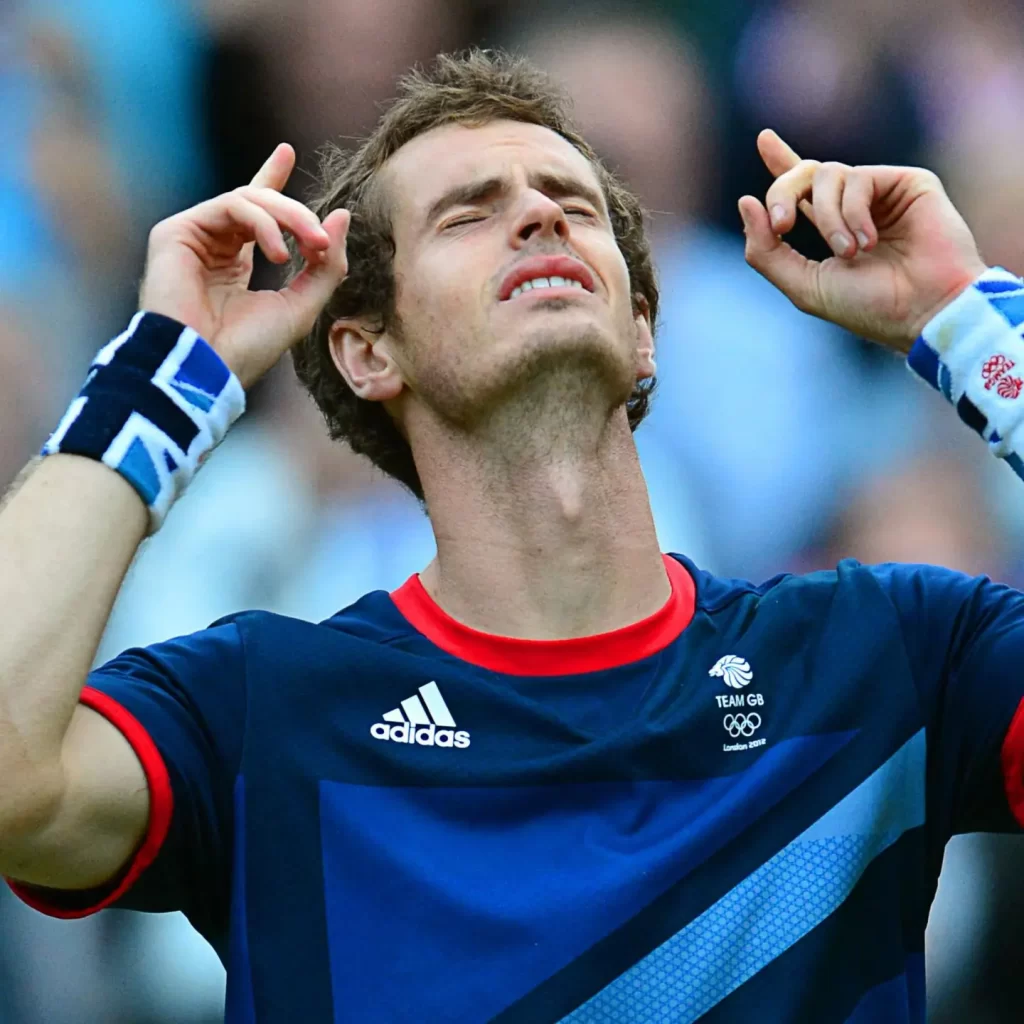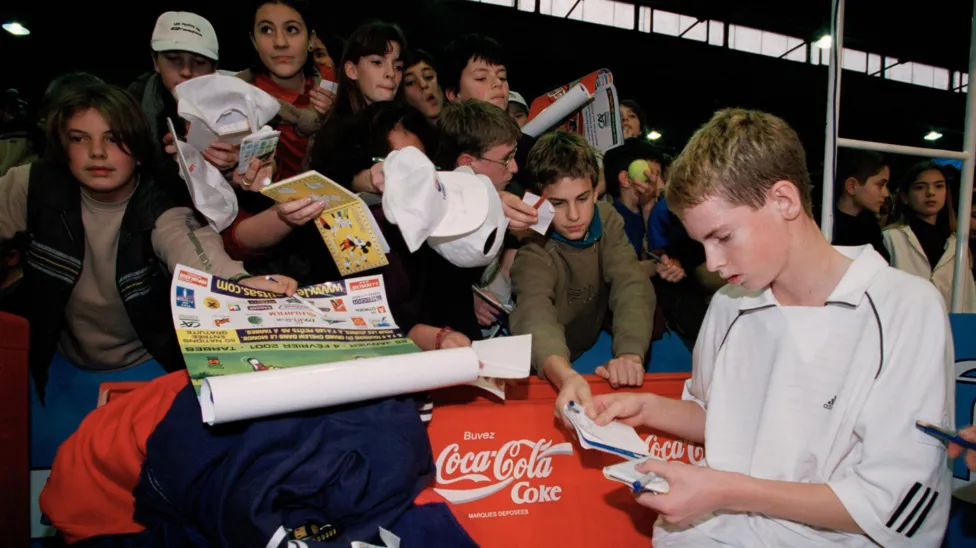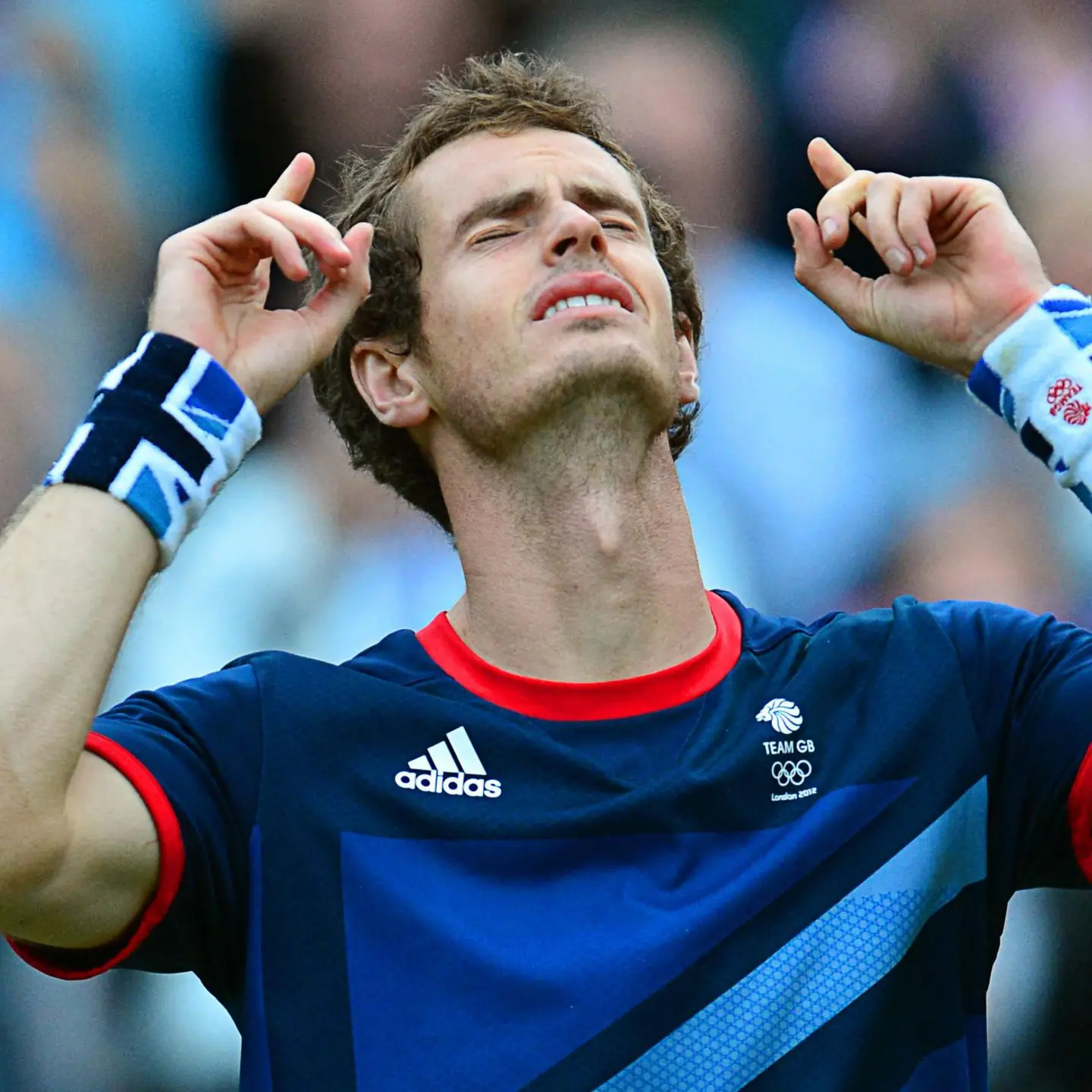Inscribed above the doors that lead to Wimbledon’s Centre Court is a famous line from Rudyard Kipling’s poem, If.
“If you can meet with Triumph and Disaster and treat those two impostors just the same,” it reads.
It is there to remind the world’s best and their challengers that you are defined by more than the scoreboard.
No-one knows that as well as Andy Murray.
The grass courts at SW19 were the scene of a four-week period in 2012 that changed the way a swathe of the British public thought of Murray. Beaten in the Wimbledon final, he regrouped, returned and won Olympic gold on the same court in front of packed stands.
He swore. He cried. He celebrated. He felt the love.
This is the story of the 28 days that confirmed Murray as a national treasure.

Before he was Sir Andrew Murray OBE, world number one, three-time Grand Slam champion, one of the nation’s greatest-ever athletes… he was, to one woman at least, something altogether less celebratory.
In 2006, the football World Cup was taking place at the same time as Wimbledon. A 19-year-old Murray, himself once a promising youth footballer, joked in an interview that he would support “whoever England were playing against”.
It went down like a lead balloon. He was abused in the comments of a blog he wrote on his website and even his wristbands, decorated with the Scottish saltire, attracted scrutiny.
Murray had become a lightning rod, attracting ire in an edgy Anglo-Scottish atmosphere. The previous month, the then Scottish First Minister had been criticised for saying he would not be supporting England.
But the reaction to Murray’s joke was on a far larger scale.
In the aftermath, Murray, playing only his second Wimbledon, walked past a spectator on the way to his match. He overheard her telling a friend, in expletive-laden and anti-Scottish language, that she had just spotted him.
“I was like, What? I was 19. This is my home tournament. Why is this happening?” Murray remembered in a 2017 interview., external
“I was still a kid and I was getting things sent to my locker saying things like: ‘I hope you lose every tennis match for the rest of your life.'”
By the time 2012 rolled around, Murray had already broken new ground.
He had reached the US Open final in 2008, becoming the first British man to make a major final since Greg Rusedski in New York 11 years earlier.
Two further Slam final appearances followed – the Australian Open in 2010 and 2011 – but Britain was still searching for a first male major singles champion since Fred Perry in 1936.
But the ambivalence of some of the general public remained.
As the Twitter joke went, Murray was British when he won and Scottish when he lost.
It sometimes seemed there was something inordinate about Murray – his outspokenness was loved to a certain point, his on-court anger amusing when he was winning but derided when he was losing.
At this point, Murray was a nascent member of the Big Four. Roger Federer was transcendent, described as a ‘god’, especially at Wimbledon. Rafael Nadal had the grit, the determination, the never-say-die attitude.
Novak Djokovic, another relative newcomer trying to upset their duopoly, defied belief, limbs bending every which way, equipped with an endurance level and mental strength few can match.
But Murray? Murray was the most human. A man who sometimes looked as if he actively hated the sport of tennis. No-one could ever accuse Murray of hiding his emotions. And that rubbed up some the wrong way.
He was accused of being whingey, of being anti-English, of being boring, when really he was doing what we all do – getting frustrated about the job and attempting to have a laugh along with it.
“I think it’s very difficult for any young player who is thrust into the spotlight to get to grips or feel comfortable with facing and understanding the media,” said his mum Judy, speaking on Andy Murray: Will to Win, a recent BBC Sport documentary.
“One of the things in tennis is that players have to face the media after every match whether they win or lose. Of course, it’s a lot easier to face the media when you’re winning.
“As an 18-year-old he’d had a little bit of media training but nothing really prepares you for suddenly being in front of a room of about 300 people.
“I think his reaction to anything is to be truthful and say what you’re thinking. In years to come, you will become much more practised.”

And so to Wimbledon. The crowds gathered on Henman Hill – in the days when shouts of “come on, Tim!” still raised a chuckle on Centre Court – to watch the human take on the god.
It was Murray’s first Wimbledon final, Federer’s eighth. The newspapers declared Murray a hero, talking about his date with destiny. But as one paper asked on their front page: “Can he finish the job?”
John McEnroe, commentating on BBC TV, pointed out the quandary for the crowd. “I’m interested to see what will happen if and when, as we expect, the crowd gets behind Murray. He should be reminding them that I have no Wimbledon wins and Federer has six – but everyone loves Roger.”
The tennis was electric. Murray was excellent. Federer was better. But it was the speech that followed, made as Murray walked up to accept the runner-up trophy, that lingers in people’s minds.
Murray puffed out his cheeks as he tried to speak, before he was drowned out by the noise from the crowd. He smiled, shook his head and exhaled before, with a voice on the verge of breaking, saying: “I’m going to try this. And it isn’t going to be easy…”
Even now, it’s hard to watch. His voice cracked throughout. There’s the dry humour – Federer “is not bad for a 30-year-old” – and the heartfelt thanks to his team. The acknowledgement that “I’m getting closer”, both honest and cruel to think about. But it’s the bit where he thanks the crowd, the raw emotion, that really cuts through.
He was held up by three separate ovations before departing to another. By the end, his mother, wife-to-be and plenty of those in the stands were in tears.
“I felt like I was playing for the nation,” Murray said later. “And I couldn’t quite do it.”
It was pure emotion. The man who had been accused of being cold, grumpy, anti-English, was standing at Wimbledon – that most quintessentially English of places – in tears, telling the crowd how much their support means to him.
“To watch him communicate how much that moment meant to him made me want to root for him more, no question,” Henman said in a BBC retrospective in 2020.
“I find it slightly sad that it took him to cry in his acceptance speech for people to suddenly take a step back and go: ‘Wow, he has got a heart. He is a sensitive soul.'”
The defeat certainly cut deep.
“I was unbelievably upset, disappointed and all of those things,” says Murray looking back at that defeat by Federer.
“I said to myself after that I may never win a Grand Slam. I was working as hard as I could work and getting close, but it was never quite enough.
“But the Olympics was coming up and I had to make the most of it. I got back on the practice court and ended up having probably the most important week of my tennis career.”
Four weeks to the day after the Wimbledon final, at the same venue, Murray was striding out behind Federer once again.
This time, it was the Olympics. The weather had gone from drizzly to baking hot, the roof wide open to let the sunlight flow down on to Centre Court.
And, with the All England Club’s all-white dress code out the window and Britain gripped by the Games, the atmosphere was bubbling.
